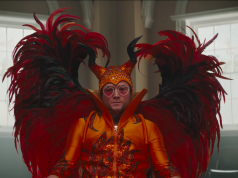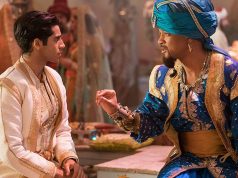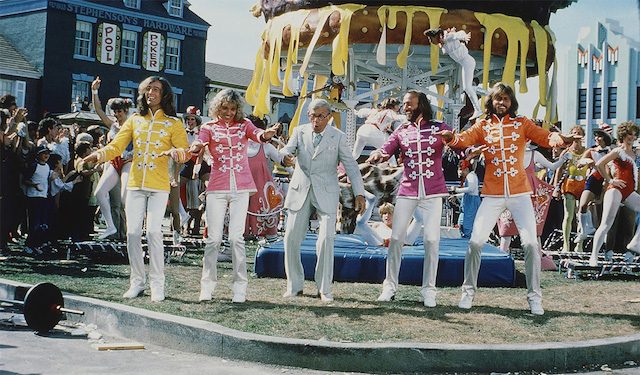
Do you love the music of The Beatles but wish you hated it? Then have I got the thing for you! The 1978 film “Sgt. Pepper’s Lonely Hearts Club Band” accomplishes what many scholars believed was impossible: it renders the Fab Four dull, grating, and unlistenable, just like your grandparents always said they were.
The man responsible for making senior citizens right about something for once was Robert Stigwood, the Australian impresario who managed The Bee Gees, produced “Saturday Night Fever,” and just generally made the 1970s excruciating. He figured that since everyone loved The Beatles, everyone would also love a movie where Beatles songs were strung together into a nonsensical plot and sung by non-Beatles. Which is sort of like saying that if you love peanut butter, you’ll also love a fistful of peanuts shoved up your nose, by The Bee Gees.
In “Sgt. Pepper’s Lonely Hearts Club Band,” Sgt. Pepper was a real soldier and musician whose band somehow helped win World War I. (History buffs will be annoyed at the suggestion that the Kaiser was defeated through the power of song, when in fact it was through the majesty of dance.) Sgt. Pepper and the boys return to their American hometown of Heartland as heroes. To pay tribute, the town puts a gold weather vane shaped like Sgt. Pepper on top of city hall, recognizing that immortalization in an archaic meteorological device is the greatest honor a society can bestow. Then Sgt. Pepper gets old and dies, as one does, and his bandmates, eh, who cares about them.
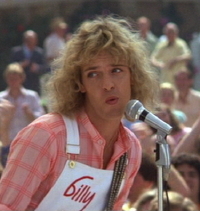
Then it’s the 1970s and Sgt. Pepper’s grandson, Billy Shears (Peter Frampton), clad in white overalls that say “Billy” on them, re-forms the band, declaring himself the new Sgt. Pepper. I guess “Sgt. Pepper” is a title, like Caesar. New Sgt. Pepper-for-life Billy chooses as his bandmates the Henderson brothers, played by Barry, Robin, and Maurice Gibb, aka The Bee Gees. The new band is a rousing success in Heartland, which is a quaint burg with a gazebo in the town square and only the vaguest hint of a meth problem. The mayor, Mr. Kite — played by George Burns, who in 1978 was only 132 years old — LOVES the new, slightly disco-fied sound of Sgt. Pepper’s Lonely Hearts Club Band, and so do all the townsfolk.
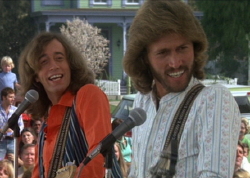
The band is immediately lured to Los Angeles by the promise of a record deal, and the four bony, long-haired goons are bedazzled by the sights and sounds of La-La-Land. They are particularly enchanted by a jewel-encrusted girl group called Lucy & the Diamonds (GET IT??)**.
So far, none of this is any dumber than your average musical story line, except insofar as the songs only loosely fit the action on account of having been written a decade earlier and not for a musical. But the same is true of “Mamma Mia!,” and “Mamma Mia!” turned out to be a rancid, festering, intolerable screechfest. So I don’t know what my point was.
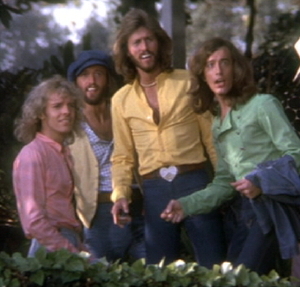
But then things get very weird, even weirder than gold weather vanes and Peter Frampton wearing white overalls. Back in Heartland, the evil Mr. Mustard (Frankie Howerd) arrives to do the bidding of a mysterious villain whose motto is “We hate love; we hate joy; we love money.” The unnamed fiend — let’s assume it’s Rupert Murdoch — orders Mr. Mustard to replace Heartland’s wholesomeness with video arcades and hamburger stands. Mr. Mustard is also assigned to steal Sgt. Pepper’s original instruments from their display in city hall and deliver them to ill-defined villains played, for some reason, by Steve Martin, Alice Cooper, and Aerosmith.
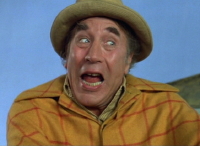
In his spare time, Mr. Mustard takes an unsettling interest in Sgt. Pepper Billy’s girlfriend, a simple, small-town gal whose name, I regret to inform you, is Strawberry Fields. After Heartland is ruined, Strawberry heads to Hollywood to get Sgt. Pepper Billy’s help, followed by pervy Mr. Mustard, whose Mustardmobile is stolen by Billy, the Bee Gees, and Strawberry, who then go to retrieve the instruments from Steve Martin, Alice Cooper, and Aerosmith. It’s the classic “hero’s journey” found in all great literature that was written under the influence of LSD.
Billy is electrocuted during one of these capers, and the narrator tells us he can only be healed “by the power of true love,” though no source is cited for this diagnosis. Strawberry Fields weeps over Billy’s comatose body and sings “Strawberry Fields Forever,” a song that makes no sense whatsoever in this context:
“Let me take you down, ’cause I’m going to Strawberry Fields.
Nothing is real and nothing to get hung about.
Strawberry Fields forever.”
If you were dying, how helpful do you think it would be for me to sob next to you while singing a song whose primary lyrics were my own name?
“Let’s get in a car and drive down to Eric D. Snider
Nothing could be finer than Eric D. Snider.
Eric D. Snider forever.”
I submit that this would not be helpful in the least.
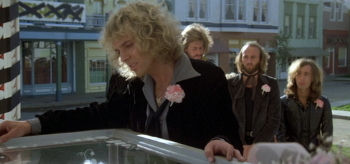
But it works in Sgt. Pepper Billy’s case, so what do I know? Then Strawberry Fields is killed by Aerosmith — kind of by accident, but you never know with Aerosmith — and no amount of singing “Golden Slumbers” to her glass-coffin-encased corpse can bring her back.
You know what can bring her back, though? You’ll never guess. Seriously, you won’t. I know sometimes I make fun of predictable movies by feigning surprise at their obvious plot turns, but this is not one of those times. You really will not guess what can resurrect Strawberry Fields.
Give up? The answer is that the gold weather vane comes to life, taking the form of Beatles collaborator Billy Preston, and sings “Get Back” while zapping all of Heartland’s problems away.

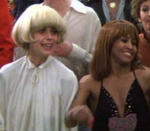
Mr. Mustard and his henchman are turned into a nun and friar; Strawberry is restored to life; and Sgt. Pepper Billy — who had just leapt from a building in despair over Strawberry’s death — is whisked back to safety. After this, the film’s title song is sung, “We Are the World”-style, by a chorus of several dozen famous people, including (why not?) Carol Channing and Tina Turner. The end.
This is the kind of movie that would be fascinatingly odd if it weren’t so bloody boring. I haven’t even mentioned Mr. Mustard’s black vinyl fembots, or the time he kidnaps Strawberry Fields and sings “When I’m 64” to her, or Billy’s jealous stepbrother who acts as the band’s manager and tries to steal all their money with Lucy (of Lucy and the Diamonds), or the fact that one of the film’s chase sequences involves a hot-air balloon. When you dump all the details into one pile like that, it sounds like the movie is wacky good fun. But no. It is neither wacky, good, nor fun. Like a Unabomber manifesto or a Scientology lecture, it manages to be both insane and tedious. That’s one of the worst possible combinations, right up there with The Bee Gees and Beatles music.
** “Lucy in the Sky with Diamonds” was a popular song by 1960s recording artists The Beatles.
— Film.com



